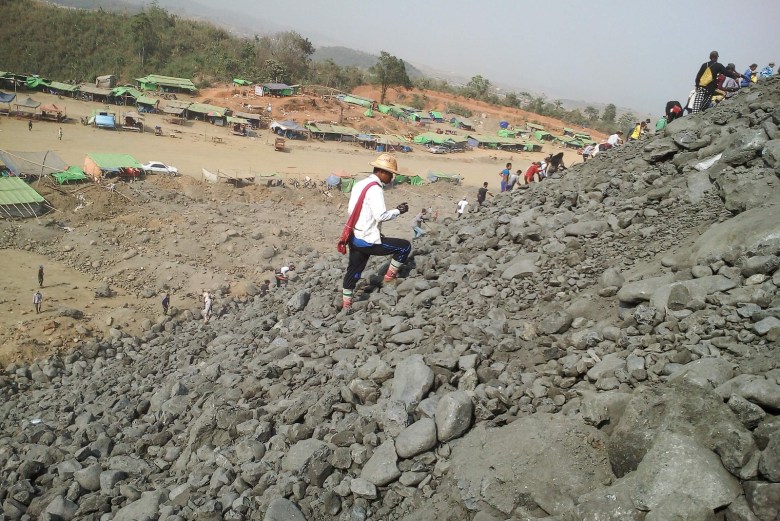Politics
US Lifts Sanctions on Myanmar, Bolsters China’s Regional Influence

The US Treasury Department announced on July 25, 2023, the lifting of sanctions on associates of Myanmar’s military junta. This decision marks a significant shift in US foreign policy, reversing measures imposed by the Biden administration in response to the military coup in February 2021. The previous sanctions were intended to demonstrate support for Myanmar’s pro-democracy movement amidst ongoing violence and oppression by the military regime.
Critics have described the lifting of these sanctions as a strategic error that may further empower China in Southeast Asia. Observers argue that this move aligns with a pattern of foreign policy decisions under former President Donald Trump, which some see as driven more by personal relationships than by strategic considerations. The lack of clarity surrounding the rationale for this policy shift raises concerns, especially as Congress had recently passed bipartisan legislation reaffirming support for Myanmar’s resistance against military rule.
The timing of the sanctions’ removal is notable, coinciding with praise from junta leader Senior General Min Aung Hlaing for Trump during trade discussions. Such gestures suggest a complex web of interests, including potential pressure from business lobbyists who view Myanmar’s rich reserves of rare earth metals as a vital asset for the US economy. These minerals are essential for the production of various technologies, including smartphones and military equipment.
However, the reality of Myanmar’s mining sector complicates this narrative. The country’s rare earth mines are primarily controlled by ethnic armed organizations (EAOs), particularly the Kachin Independence Organization (KIO), which governs areas along the border with China. The KIO recently took control of significant heavy rare earth mines, raising questions about US engagement strategies. Some lobbyists are advocating for direct cooperation with the KIO or negotiating a peace agreement between the KIO and the junta to facilitate resource extraction.
The suggestion to partner with the KIO raises logistical challenges. The Kachin State is landlocked and surrounded by junta-controlled areas, complicating any operational plans. Moreover, the KIO’s motivations extend beyond mere profit; its leadership pursues political goals, seeking greater autonomy and resisting military control. The notion that the KIO would compromise its political objectives for a business deal with the US overlooks its long-standing commitment to political resistance.
Simultaneously, the United Wa State Army (UWSA), a powerful non-state military group backed by China, is ramping up its mining activities in the region. Any attempts by the US to gain a foothold in Myanmar’s rare earth sector may not only be unrealistic but could also inadvertently strengthen China’s influence. Beijing has already capitalized on the recent reductions in US aid to Myanmar, further solidifying its role as a key player in the region.
The implications of lifting sanctions extend beyond geopolitics; they risk legitimizing the junta’s authority and undermining the efforts of Myanmar’s resistance movement. The military government is likely to use this policy reversal to bolster its narrative of legitimacy, particularly as it prepares for elections that many observers deem to be a facade.
Despite ongoing promises of support, the Biden administration has struggled to follow through on commitments to Myanmar’s resistance fighters. Reports indicate that assistance outlined under the Burma Act has not materialized, leaving many within the resistance feeling abandoned. The rollback of even limited support from the West may compel these groups to reassess their alliances, potentially fostering closer ties with China.
While the KIO and other EAOs historically sought Western support, the evolving geopolitical landscape may shift their strategies. As the KIO navigates its complex relationship with China, it faces a pivotal decision: whether to engage with the US based on proposals that may ultimately empower the junta or to align more closely with Beijing.
The long-term consequences of Trump’s foreign policy decisions could reshape the dynamics in Southeast Asia, diminishing US influence and isolating Myanmar’s people further. This situation underscores the challenges faced by those advocating for democracy and human rights in Myanmar, as they confront a landscape increasingly dominated by powerful external forces.
Dr. David Brenner, an associate professor in international relations at the University of Sussex, warns that the current trajectory of US foreign policy risks sidelining pro-democracy movements and empowering entities that favor closer relations with China. The stakes are high, with the potential for a significant shift in the balance of power within the region as the global community watches closely.
-

 World5 months ago
World5 months agoSouth Korea’s Foreign Minister Cho Hyun to Visit China This Week
-

 Business5 months ago
Business5 months agoStarling Bank Plans Secondary Share Sale, Targeting $5.4 Billion Valuation
-

 Top Stories5 months ago
Top Stories5 months agoMunsang College Celebrates 100 Years with Grand Ceremony
-

 World5 months ago
World5 months agoPAS Aims to Expand Parliamentary Influence in Upcoming Election
-

 Business7 months ago
Business7 months agoKenvue Dismisses CEO Thibaut Mongon as Strategic Review Advances
-

 Lifestyle6 months ago
Lifestyle6 months agoHumanism Camp Engages 250 Youths in Summer Fest 2025
-

 Sports6 months ago
Sports6 months agoDe Minaur Triumphs at Washington Open After Thrilling Comeback
-

 Sports7 months ago
Sports7 months agoTupou and Daugunu Join First Nations Squad for Lions Clash
-

 Top Stories7 months ago
Top Stories7 months agoColombian Senator Miguel Uribe Shows Signs of Recovery After Attack
-

 World7 months ago
World7 months agoASEAN Gears Up for Historic Joint Meeting of Foreign and Economic Ministers
-

 Health6 months ago
Health6 months agoNew Study Challenges Assumptions About Aging and Inflammation
-

 Business7 months ago
Business7 months agoOil Prices Surge Following New EU Sanctions on Russia









